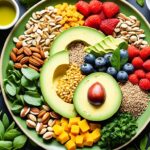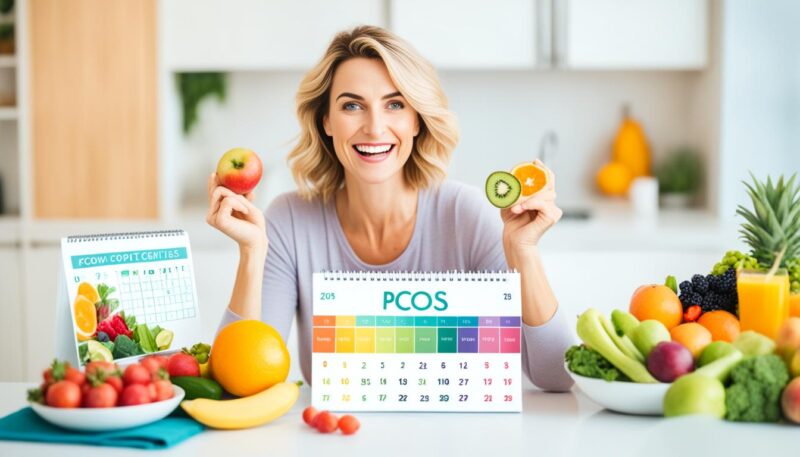Symptoms of PCOS can be tough both physically and emotionally. Having faced this myself, I know the struggles and the wish for natural solutions. Let me show you how a dairy-free diet can help with PCOS symptoms.
After my PCOS diagnosis, I tested different ways to feel better. Trying different things taught me a lot. Cutting out dairy consistently improved how I felt. It touched my energy, mood, and weight. Dairy seemed to make my inflammation, and PCOS symptoms, worse.
Studies have found dairy-free diets could help manage PCOS symptoms. An article in the Journal of Clinical & Experimental Endocrinology & Diabetes says getting rid of dairy might balance hormones and lower insulin resistance. These are crucial for handling PCOS.
Choosing a dairy-free PCOS diet opens up lots of tasty and healthy choices. Try things like almond milk and coconut yogurt. There are also special recipes for PCOS. Making this change can feel good and powerful.
Key Takeaways:
- A dairy-free diet can help manage PCOS symptoms naturally.
- Eliminating dairy may improve hormonal balance and reduce insulin resistance.
- Dairy alternatives and PCOS-specific recipes and meal plans offer delicious and nutritious options.
- Consulting with a healthcare provider and a dietitian is recommended for a personalized approach.
- Adopting a dairy-free PCOS diet can be empowering and transform your relationship with food.
Understanding PCOS and Inflammatory Conditions
PCOS is a hormonal disorder that affects many women worldwide. It’s critical to manage the low-grade inflammation often linked with this condition. By knowing the link between PCOS and inflammation, we can adjust our diet and lifestyle. This helps support our health and well-being.
There’s no direct link between PCOS and dairy. But, some may be allergic to lactose or intolerant, leading to more inflammation. In these cases, cutting dairy out of your diet might help. Also, those with PCOS and gluten sensitivities might benefit from omitting gluten.
It’s key to add anti-inflammatory foods to our diet to handle PCOS and curb inflammation. These foods include colorful veggies, fruits, whole grains, and probiotics. They help heal our bodies and might lessen PCOS symptoms.
Anti-inflammatory foods for PCOS management:
- Leafy greens like spinach, kale, and broccoli
- Berries such as blueberries, strawberries, and raspberries
- Whole grains like quinoa, brown rice, and oats
- Healthy fats from avocados, nuts, and seeds
- Probiotic-rich foods such as yogurt, sauerkraut, and kimchi
Eating a balanced, nutritious diet is also key. This should be personalized to meet individual needs. A healthcare provider or dietitian who knows about PCOS can offer tips. They can help create a meal plan that manages PCOS well.
To learn more, check out this study on PCOS and inflammation. Understanding the link between PCOS and inflammation lets us make better choices. This can help improve our health and well-being.
Exploring the Impact of Dairy on PCOS
Some research has looked at how dairy and PCOS relate. It’s found that dairy is linked to obesity, which might be related to PCOS. But we’re still unsure. We do know that drinking milk more often can lead to more acne, a key sign of PCOS. Yet, cutting back on dairy might not fix all PCOS signs.
How dairy affects PCOS signs needs thought. While dairy might not directly cause issues like trouble getting pregnant or high androgen levels, it might make acne worse, which is a PCOS symptom.
Less dairy might help those worried about acne in PCOS. But remember, just changing what you eat might not solve everything. It’s key to work with pros for the best PCOS care.
But to truly grasp how dairy and PCOS link, we need more studies. It’s wise for those with PCOS to team up with doctors and dietitians. This way, they can set a plan tailored to them.

For more insights on dairy and PCOS, check out this study. It’s done by experts on the topic.
The Role of Dairy in Fertility and PCOS
Research is looking into how dairy affects fertility for those with PCOS. There are studies that show high-fat dairy might help you get pregnant. But, it’s best to talk to a healthcare provider if you’re thinking of having a baby and consume dairy.
For those who avoid dairy, there are other ways to get your calcium. Foods like kale, broccoli, and salmon are good choices. Always check with a doctor to see what’s best for you and your PCOS diet.
The Impact of High-Fat Dairy Products
Sources from dairy with more fat can help your body a lot. They have calcium and vitamin D. Some research sees a link between full-fat dairy and better fertility for women with PCOS. It might help to balance your hormones and improve the process of ovulation.
But, dairy and PCOS are different for everyone. For some, high-fat dairy makes their symptoms worse. Talk to a healthcare provider or a dietitian before changing what you eat in a big way.
Non-Dairy Calcium Sources
If you don’t eat dairy, you can still get enough calcium. Foods like kale, broccoli, and salmon work well. They support your bone health and help with fertility.
These foods are good for anyone with PCOS, lactose intolerance, or who is vegan. Adding them to your diet ensures you get the calcium you need every day.
Consultation with a Healthcare Provider
For managing PCOS and fertility, working with a healthcare provider is key. They can offer personalized advice. This includes whether and how to include dairy in your diet.
Remember, what’s right for someone else might not be right for you. You and your healthcare professional can create a diet plan that meets your needs. This can also increase your chances of getting pregnant.
The Importance of Diet in PCOS Management
Keeping a healthy diet is key for managing PCOS. Even though there’s no one-size-fits-all diet, several rules can boost your health.
Eating Regularly
Eating often is important for those with PCOS. It’s not good to skip meals. Doing so can mess with your blood sugar and hormones. Have three balanced meals daily. Don’t forget to add healthy snacks in between. This keeps your energy up and stops you from eating too much at once.
Building Balanced Meals
Your meals should include proteins, fats, and carbs. Meals with protein from things like chicken and beans keep you full. Healthy fats like those in avocados and olive oil are good for you. They help make hormones. Carbs from whole grains and fruits give you energy and nutrients.
Essential Supplements
Along with a good diet, some supplements are helpful for PCOS. Vitamin B12 is key for energy and is in meat, fish, and eggs. If you don’t eat dairy, you might need a B12 supplement. Many with PCOS lack vitamin D. It’s smart to test your levels and take supplements if needed.

Collaborating with Healthcare Professionals
Making a diet and lifestyle plan for PCOS is best with expert help. Healthcare providers and dietitians can figure out what you need. They can make a plan that fits you. They also help track your progress and support you along the way.
Exercise and Weight Management
Exercise is key for PCOS management. It can make your insulin work better and balance hormones. Try for 150 minutes of cardio each week. Losing a bit of weight, like 5-10% of your body, can help a lot with PCOS symptoms.
Managing PCOS is a process that takes time and effort. By eating right, working with pros, and staying active, you can better control your PCOS and enjoy life more.
The Mediterranean Diet for PCOS
The Mediterranean diet is ideal for those with PCOS. It focuses on whole foods and fights inflammation. This diet includes lots of fresh, not processed foods, which helps with health and managing PCOS symptoms.

This diet involves fruits, vegetables, legumes, grains, nuts, seeds, and lean proteins like fish and poultry. It’s low in bad fats and sugars, great for cutting PCOS-linked inflammation.
It’s all about using unprocessed, nutrient-rich foods. These foods are full of vitamins and minerals that help with well-being and handling PCOS. Choosing these foods optimizes health and can make PCOS symptoms better.
The Importance of Balanced Plans
The Mediterranean diet is great, but there are other good plans for PCOS, too. They include lots of veggies, fruits, lean proteins, good carbs, and low-fat dairy.
Sticking to a diet with these varied foods helps with PCOS symptoms. It keeps blood sugar steady, hormones balanced, and weight in check, key for PCOS care.
Everyone’s dietary needs differ. Consulting with a healthcare expert or dietitian for a tailored PCOS diet is smart. They can personalize a diet to meet individual needs, improving PCOS symptom care.
Reducing Processed Foods and Saturated Fats
The Mediterranean diet and similar plans cut back on processed foods and bad fats. These foods can boost inflammation and make PCOS symptoms worse.
Choosing whole foods and cooking from scratch helps avoid processed food’s harm. This means less fast food, snacks, sugary drinks, and other processed items.
Instead, eat nutrient-rich whole foods. They give your body vitamins, minerals, and antioxidants. These fight inflammation and help manage PCOS well.
- Include a variety of colorful fruits and vegetables rich in antioxidants.
- Choose lean protein sources like fish, poultry, and legumes.
- Incorporate healthy fats from sources such as olive oil and avocados.
- Opt for whole grains and limit refined carbohydrates.
- Enjoy low-fat dairy products or suitable alternatives if preferred.
A well-balanced, whole food, low-sat-fat plan is key to PCOS care. It helps with PCOS management and boosts overall health.
Foods to Avoid and Include in a PCOS Diet
Managing PCOS with diet means being careful what we eat. It’s best to stay away from foods that trigger more PCOS symptoms. These are usually fried meals, foods high in saturated fats, snacks that come from a box, and drinks with lots of sugar. Eating these can make inflammation worse and throw off our hormones. This can make PCOS even harder to handle.
Instead of those, focus on whole foods. These are foods that are not processed and don’t contain a lot of added ingredients. Foods like fatty fish, including salmon, are great. They help lower inflammation and keep hormones in check. Beans are also good. They offer a lot of fiber and protein from plants. They can help keep blood sugar steady and help with keeping a healthy weight.
Don’t forget about your vegetables. Veggies like broccoli, spinach, and kale are full of good things like vitamins and minerals. They also have a lot of stuff called antioxidants. These veggies don’t cause quick rises in blood sugar because they have a low glycemic index.

Fiber is key for a good PCOS diet. It keeps digestion running smoothly and can help you feel full. Pick whole grains like quinoa and brown rice over sorts like white bread and white rice. Whole grains have more good stuff in them and don’t mess with your blood sugar like refined foods can.
Drinking enough water is very important for those with PCOS. Choose water or drinks with little sugar over the sugary kind. This can help keep your blood sugar from spiking. Also, healthy fats from foods like avocados, nuts, and seeds are beneficial. They can better how your body uses insulin and help keep your hormones on track.
Following a diet that avoids bad food and includes lots of good food can really help with PCOS. Always talk to an expert, like a healthcare professional or a dietitian, before making big changes to your diet. They can help you come up with a plan that’s just right for you.
Dietary Supplements for PCOS Management
Certain dietary supplements can help manage PCOS. They work well with diet and lifestyle changes. But, it’s important to talk to a healthcare provider before you start using any.
The following supplements may benefit people with PCOS. They can help balance hormones, improve how your body uses insulin, and cut down on inflammation:
- Inositol: Inositol boosts your body’s response to insulin. This can help with ovulation and lower androgen levels in women with PCOS.
- Chromium: Chromium makes your body more sensitive to insulin. It helps with how your body handles sugars, which is key for managing PCOS.
- Cinnamon: Cinnamon may lower your blood sugar and improve insulin response. It can also help with keeping your menstrual cycles regular.
- Turmeric: Turmeric fights inflammation. It can help balance your hormones too, which are both important for managing PCOS.
- Zinc: Zinc is good for ovarian health and helps your body respond better to insulin. It also boosts your immune system, a plus for those with PCOS.
- Evening Primrose Oil: This oil is packed with omega-6 fats. It helps with inflammation, hormone balance, and can make your skin healthier.
- Combined Vitamin D and Calcium: Vitamin D and calcium are super important for bones. They also improve how your body uses insulin, key for PCOS management.
- Cod Liver Oil: Cod liver oil is full of omega-3 fats and vitamin D. It’s good for fighting inflammation, supporting your reproductive system, and aiding insulin response.
- Berberine: A natural compound, berberine, may help with insulin resistance and lower androgens in women with PCOS.
- Adaptogen Herbs: Herbs like ashwagandha and rhodiola rosea can help ease stress, support adrenal health, and help balance hormones in PCOS.
- Probiotics: Probiotics are great for your gut. They can reduce inflammation and help with how your body uses insulin in PCOS.
Always talk to a healthcare provider about these supplements. They can figure out the best ones for you and how much to take. They’ll help make a plan just for you to manage your PCOS.
Using these supplements along with a healthy diet, regular exercise, and other lifestyle changes can be very helpful in PCOS management.

Lifestyle Changes for PCOS Management
Managing PCOS means keeping a healthy weight and being active. Doing both with a good exercise plan and diet helps a lot. It makes you feel better and can lower PCOS signs.
Maintaining a Healthy Weight
Keeping the right weight is key. Doing exercise regularly and eating well helps a lot. It balances your hormones and keeps you from getting other health issues.
Activities like yoga and swimming are great if you have PCOS. They build your muscles, make you more flexible, and help your heart. And they’re not too tough on your body.
Good Sleep Hygiene and Stress Reduction
Good sleep and less stress help with PCOS. Setting up a calm bedtime and a cozy place to sleep is important. It keeps your hormones in check and makes you feel good overall.
Finding ways to relax, like deep breaths, meditation, or hobbies, is important too. It helps keep your hormones in balance. And it makes dealing with PCOS easier.
Avoiding Endocrine Disruptors
Endocrine disruptors can make PCOS worse. They mess with your hormones. It’s best to stay away from them by not using certain products or eating certain foods.
Choosing natural, organic items when you can is a good idea. It helps you stay away from things that throw off your hormones.
Acupuncture as a Complementary Treatment
Acupuncture might be helpful for PCOS. It targets certain points to balance your hormones, lower stress, and manage your weight. It’s a natural way to take care of yourself.
If you’re thinking about acupuncture, make sure the person is an expert in PCOS. They can give you safe, good advice.

These changes can make a big difference in how you deal with PCOS. They can lead to a better life.
Conclusion
Managing PCOS is best done with a plan that fits you, like one without dairy. Every person’s PCOS is different, so what works for one may not work for another. It’s key to work closely with your healthcare team to create a diet and lifestyle plan made just for you.
Avoiding dairy can be good for some PCOS symptoms, like acne. But, PCOS health isn’t just about what you eat. It’s also about staying active, keeping healthy weight, sleeping well, and dealing with stress healthily. This whole lifestyle approach is very important.
Using a personal plan and changing your lifestyle can really help with PCOS. It’s important to talk with experts like your doctor and a dietitian who know about PCOS. Remember, your PCOS journey to better health is about what works for you.
To dive deeper into how your diet can affect PCOS, check this study. It has great info on diet and PCOS management.














